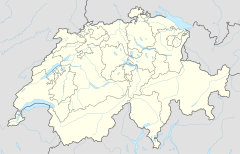
Bern[bɛrn](listen) is the de facto capital of Switzerland, referred to by the Swiss as their "federal city", in German: Bundesstadt, French: ville fédérale, and Italian: città federale. With a population of about 144,000, Bern is the fifth-most populous city in Switzerland. The Bern agglomeration, which includes 36 municipalities, had a population of 406,900 in 2014. The metropolitan area had a population of 660,000 in 2000. Bern is also the capital of the canton of Bern, the second-most populous of Switzerland's cantons.

Wald is a municipality in the Bern-Mittelland administrative district in the canton of Bern in Switzerland.
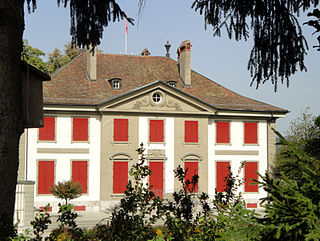
The rural palace of Lohn in Kehrsatz, near Bern, Switzerland, is the official estate of the Swiss Federal Council, the government of Switzerland. It is a Swiss heritage site of national significance.

Hofwil is a village in the canton of Bern, Switzerland, part of the municipality of Münchenbuchsee.

Adrian von Bubenberg was a Bernese knight, military commander and mayor (Schultheiss) of Bern in 1468-1469, 1473-1474 and 1477-1479. In Switzerland, he is remembered as the hero of the Battle of Murten.

Niklaus Manuel Deutsch, of Bern, was a Swiss artist, writer, mercenary and Reformed politician.

Hans Gieng was a Swiss Renaissance sculptor best known for his public fountain figures in the Old Town of Bern as well as Fribourg.

The Old City is the medieval city center of Bern, Switzerland. Built on a narrow hill surrounded on three sides by the river Aare, its compact layout has remained essentially unchanged since its construction during the twelfth to the fifteenth century. Despite a major fire in 1405, after which much of the city was rebuilt in sandstone, and substantial construction efforts in the eighteenth century, Bern's old city has retained its medieval character.
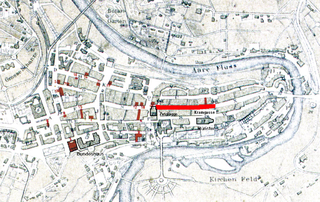
The Kramgasse is one of the principal streets in the Old City of Bern, the medieval city centre of Bern, Switzerland. It was the center of urban life in Bern until the 19th century. Today, it is a popular shopping street. Its length, slight curve and long line of Baroque façades combine to produce Bern's most impressive streetscape.

The Gerechtigkeitsgasse is one of the principal streets in the Old City of Bern, the medieval city center of Bern, Switzerland. Together with its extension, the Kramgasse, it is the heart of the inner city. Hans Gieng's most famous fountain figure, the statue of Lady Justice on the Gerechtigkeitsbrunnen, commands the view of the street's gentle slopes and curves.

The Gerechtigkeitsbrunnen is a 16th-century fountain in the Gerechtigkeitsgasse in the Old City of Bern, Switzerland. It is the only Bernese fountain to retain all original design elements, and is listed as a cultural heritage of national significance.
The de Steiger family was a Bernese patrician family of the Swiss ancien régime.

The Erlach family was a Bernese patrician family. They first became citizens of Bern around 1300. During the 17th and 18th Centuries they were one of the leading families in Bern. For centuries the family served as senior military commanders in both Bern and in foreign armies. They were mayors of Bern and ruled over many other towns and cities in western Switzerland. Several family members received the upper nobility title "Reichsgraf".
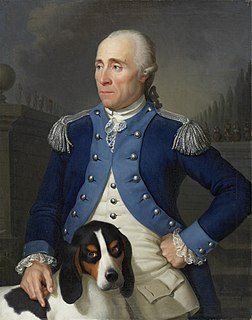
Franz Rudolf Frisching (1733–1807) was a Bernese patrician, officer, politician and industrialist.

The Béatrice-von-Wattenwyl-Haus is a town mansion on the Junkerngasse No. 59 in the Old City of Bern, only a few steps away from the Erlacherhof.
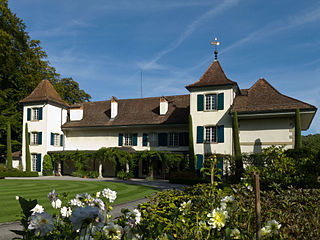
Bremgarten Castle is a castle in the municipality of Bremgarten of the canton of Bern in Switzerland. It is a Swiss heritage site of national significance.

Rümligen Castle is a castle in the municipality of Rümligen of the Canton of Bern in Switzerland. It is a Swiss heritage site of national significance.
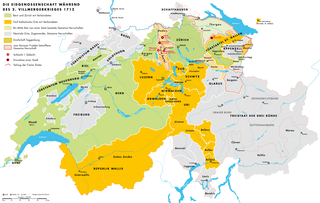
The Toggenburg War, also known as the Second War of Villmergen or the Swiss Civil War of 1712, was a Swiss civil war during the Old Swiss Confederacy, that took place from 12 April until 11 August 1712. On the one hand there were the Catholic "inner cantons" and the Imperial Abbey of Saint Gall, on the other the Protestant cantons of Bern and Zürich as well as the abbatial subjects of Toggenburg. The conflict was simultaneously a religious war, a war for the hegemony within the Confederacy and an uprising of subjects. The war ended in a Protestant victory and toppled the balance of political power within the Confederacy.
The following is a timeline of the history of the municipality of Bern, Switzerland.

Trostburg Castle is a small castle in the municipality of Teufenthal in the canton of Aargau in Switzerland.

